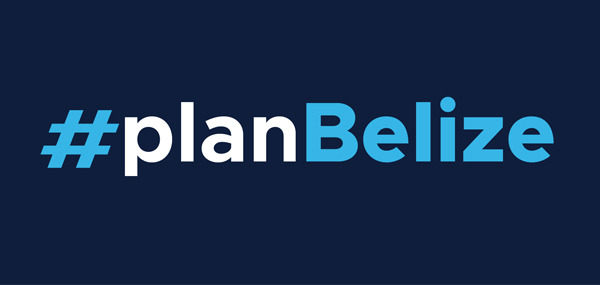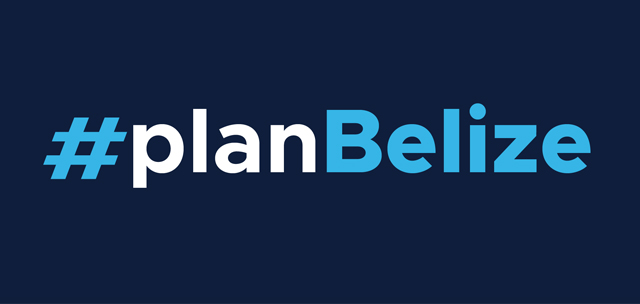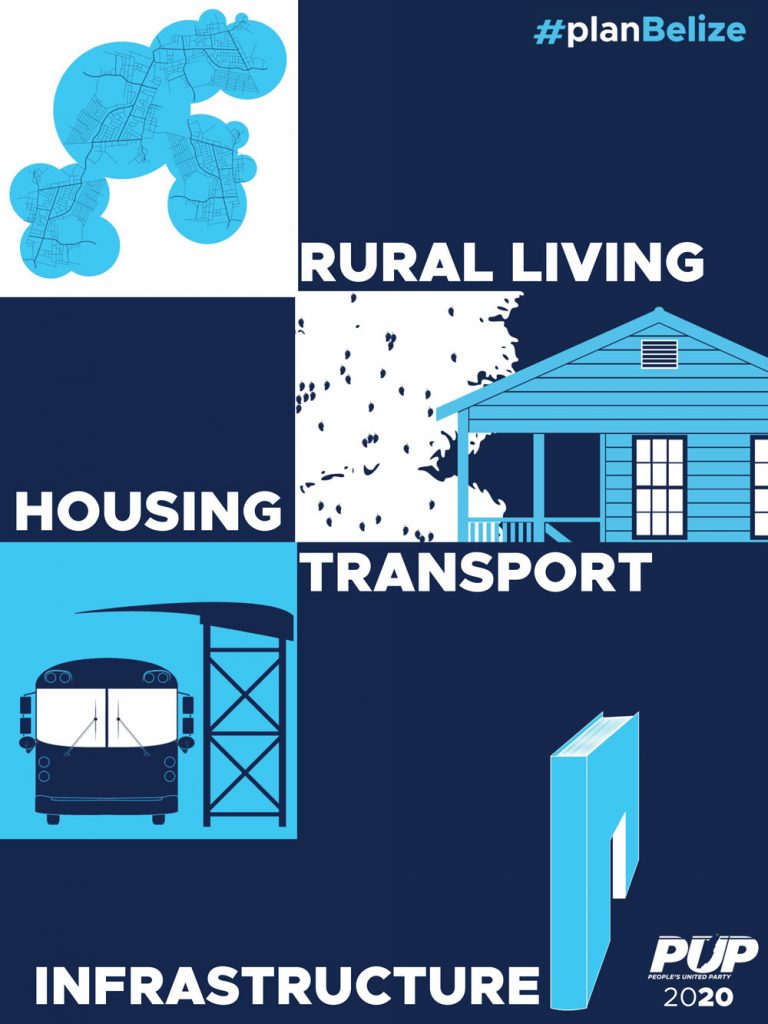POLICY PAPER ON
RURAL LIVING, HOUSING,
TRANSPORT AND INFRASTRUCTURE
PEOPLE’S UNITED PARTY
Infrastructure, housing and transport are vital for national development in that they are absolutely needed to develop human resources, enable trade and commerce, power businesses, connect workers to their jobs, create opportunities for struggling communities, and protect the nation from increasingly hostile climate and natural disasters. From communication systems, railroads, hydroelectric facilities and solar farms to roads and bridges, educational facilities, expansion of the electrical grid, water supply systems, housing, buildings and parks, a good infrastructure backbone is indispensable to a healthy, productive and sustainable economic society.
Over the last 12 years, the UDP administration has borrowed huge sums, in the hundreds of millions, overspent and wasted valuable time and money on expensive highways, roundabouts, sports facilities, and nationalizing the public utilities (e.g. BTL), mainly to help themselves and their cronies to the proceeds of public contracts in order to finance political campaigns and enrich family and friends. They have failed to prioritize and select projects in accordance with the social, economic and productive needs and opportunities in order to maximise the direct benefits of these large expenditures for the people and for national development. The infrastructure program has neglected very important areas of the country which continue to date in the most deplorable conditions ever experienced in this country. The concrete proof of such poor planning and infrastructure development is clearly evident for anyone who cares to visit some communities in the urban fringes of Belize City and the main towns and, in particular, in the rural communities from north to south. Their conditions of living are deplorable!
Further, during the 2019-2020 financial year, the Government of Belize expended approximately $66.8 million in travel & subsistence, public utilities, and rents and leases for itself. For the 2020-2021 budget, the same combined costs were proposed at a total of $63.6 million. The costs related to vehicle purchase, repair and maintenance and parts alone amounted to $14.4 million for the 2018-2019 year; and the cost of new vehicles for that year amounted to some $3.9 million.
The approach of the Government to the national as well as its own transportation needs is highly inefficient and has wasted valuable resources. This waste is made worse by a complete lack of transparency in procurement of the required goods and services and leads to waste and corruption. Wasteful expenditures such as those identified are not sustainable by any means so that fundamental and sweeping reforms are required. A PUP-led Government will pursue options that improve efficiency, cost-effectiveness and the quality of service for the people in the provisions of national infrastructure, housing and public transportation.
For national infrastructure development, we need a different policy and sustainable strategy for creating jobs, for raising the quality of life of the people and creating wealth in all urban and rural communities. The next PUP-led government plans to invest in infrastructure, housing and transport but with a real people-centred agenda and in accordance with planned national priorities. The goal is to help all Belizean communities move forward toward a productive and sustainable future in coordinated, collaborative and efficient ways.
As the PUP goal of this policy, investments in modern infrastructure must lay the foundations for human, social and economic development and growth by effectively leading in planning, organising, and building houses, streets, bridges, utilities (i.e. water, sewer, energy, transport, etc.) and other facilities that make a meaningful difference in the life of the people.
Infrastructure, housing and transport are vital for national development in that they are absolutely needed to develop human resources, enable trade and commerce, power businesses, connect workers to their jobs, create opportunities for struggling communities, and protect the nation from increasingly hostile climate and natural disasters. From communication systems, railroads, hydroelectric facilities and solar farms to roads and bridges, educational facilities, expansion of the electrical grid, water supply systems, housing, buildings and parks, a good infrastructure backbone is indispensable to a healthy, productive and sustainable economic society.
Over the last 12 years, the UDP administration has borrowed huge sums, in the hundreds of millions, overspent and wasted valuable time and money on expensive highways, roundabouts, sports facilities, and nationalizing the public utilities (e.g. BTL), mainly to help themselves and their cronies to the proceeds of public contracts in order to finance political campaigns and enrich family and friends. They have failed to prioritize and select projects in accordance with the social, economic and productive needs and opportunities in order to maximise the direct benefits of these large expenditures for the people and for national development. The infrastructure program has neglected very important areas of the country which continue to date in the most deplorable conditions ever experienced in this country. The concrete proof of such poor planning and infrastructure development is clearly evident for anyone who cares to visit some communities in the urban fringes of Belize City and the main towns and, in particular, in the rural communities from north to south. Their conditions of living are deplorable!
Further, during the 2019-2020 financial year, the Government of Belize expended approximately $66.8 million in travel & subsistence, public utilities, and rents and leases for itself. For the 2020-2021 budget, the same combined costs were proposed at a total of $63.6 million. The costs related to vehicle purchase, repair and maintenance and parts alone amounted to $14.4 million for the 2018-2019 year; and the cost of new vehicles for that year amounted to some $3.9 million.
The approach of the Government to the national as well as its own transportation needs is highly inefficient and has wasted valuable resources. This waste is made worse by a complete lack of transparency in procurement of the required goods and services and leads to waste and corruption. Wasteful expenditures such as those identified are not sustainable by any means so that fundamental and sweeping reforms are required. A PUP-led Government will pursue options that improve efficiency, cost-effectiveness and the quality of service for the people in the provisions of national infrastructure, housing and public transportation.
For national infrastructure development, we need a different policy and sustainable strategy for creating jobs, for raising the quality of life of the people and creating wealth in all urban and rural communities. The next PUP-led government plans to invest in infrastructure, housing and transport but with a real people-centred agenda and in accordance with planned national priorities. The goal is to help all Belizean communities move forward toward a productive and sustainable future in coordinated, collaborative and efficient ways.
As the PUP goal of this policy, investments in modern infrastructure must lay the foundations for human, social and economic development and growth by effectively leading in planning, organising, and building houses, streets, bridges, utilities (i.e. water, sewer, energy, transport, etc.) and other facilities that make a meaningful difference in the life of the people.
In this policy, a PUP government will focus attention on the following, which are to:
- Amalgamate and streamline the Ministries of Works and Housing to be proactive in pursuing their missions, inspiring innovations in every area of work, holding people accountable for their actions, performing cost-benefit analyses of relevant projects, and being prepared to raise difficult issues and confront vested interests, with a view to achieving better value-for-money for resources invested. Perfect examples of non-desirable results are the Caracol and GPH-PGIA roads of the UDP administration ($200 million gone), which have been done at the expense of other more important infrastructure, including urgent investments in health care, the productive and rural sectors. We will rely on and utilize qualified experts in different fields of construction in the Ministry of Works and housing.
- Introduce a transparent regime for the certification of contractors into four levels based on experience, qualifications, work record, and financial viability and introduce such certifications as qualification for bidding on public contracts. The certifying body is to be independent and impartial and involve both public and private sector stakeholders. Requirements for each level of certification are to be fixed and published in an open and transparent manner.
- Conduct a complete forensic audit of all Belize Infrastructure Ltd (BIL) projects since its inception, inclusive of all contracts issued and signed. BIL was set up in order to bypass Parliamentary oversight and scrutiny of the Offices of the Contractor General and the Auditor General and has presided over years of wanton and reckless abuse of public resources. BIL will be abolished.
- Establish meaningful collaborations with relevant stakeholders, such as the Association of Professional Architects of Belize (APAB), Association of Professional Engineers of Belize of Belize (APEB), Planners Association, Central Building Authority (CBA), Local City and Municipal building units, and village councils, in critical areas such as development of “green” or “vernacular” architecture alternatives using more indigenous building materials,
- In coordination with the Ministry of Education, invest and encourage in training young people to participate in the construction industry by introducing more technical courses on electrical engineering, plumbing, welding, painting techniques and masonry as well as in construction technology. We are too poor of a nation to be wasting resources, implementing programmes and throwing them out the window. Much has been invested in the ITVET system. We need to seek an effective means to make it functional and affordable and to make use of such trained personnel in public service.
- In line with the International Building Code of 2018, create the first national building, industrial and infrastructure development codes to standardize and regulate designs and specifications for construction in Belize. The regulations are to include a code of ethics, and prescribe standards and specifications for building materials and operating practices. These codes will provide much needed standards for costing, financing and insurance. The enactment of these codes and standards is long overdue and will assist in reducing room for subjectivity and corruption in the infrastructure sector.
- Urgently revise and update the Building Act of Belize based on an analysis with key stakeholders of our current challenges and priorities in the building sub-sector.
- Assess main highways and existing structures to determine maintenance needs, and structural weaknesses and design a plan to address them in an orderly way
- Assess the need for road signage, including speed limit signs to be complimented by adequate enforcement and other traffic signs and take steps to address, disorganized bus and micro buses behaviour on the highway including the cleaning and maintainace protocols along our highways.
- Immediately after taking office, and as a matter of urgency, assess the risks of COVID-19 transmission in all public buildings, especially schools and related buildings, and propose required modifications to prevent the spread and exposure of COVID-19 and thereby promote the safety and wellbeing of children, teachers, and visitors. In addition, to mitigate the risk of COVID-19 transmission, new designs will be prepared for future construction of school buildings and support facilities (entrances, gymnasiums, assembly spaces, restrooms, staff offices, etc.).
- Design a long term strategy with the key stakeholders of Government and begin the construction of buildings in the appropriate locations to provide housing and facilities for several public offices in the same locations. Their design features will provide savings in utilities, maintenance cost, and transaction costs for the public, in addition to doing away with the outlays for rent and lease.
Infrastructure development was totally undermined and neglected during 3 UDP administrations. This PUP infrastructure policy is about impacting the lives of the people in the most effective manner. To this end, A PUP led government will:
- Address much needed improvements in rural communities, such as dangerous side-road gullies, lack of pedestrian walks and bicycle paths, unnecessary use of excessive speed bumps; and undertake projects to correct these problems and improve the safety of the public, motorists, cyclists, and others affected.
- Continue public education on the use of the highways, establishing highway patrolling, and continuous presence of enforcement personnel on the highways and others including garbage collection and disposal systems.
- Improve roads and bridges in some 192 villages through the establishment of local road units and local contractors, labor-intensive methods and local construction materials. Villages are the homes of approximately 54% of our population, and road access year round is absolutely necessary for them to be productive and self-sustainable.
- Promote investment in community-based infrastructure, such as health clinics, sports facilities, water systems, drains and run-off, main sewage and waste disposal systems, which will prevent our communities from mosquito–borne diseases, as identified, prioritized and agreed with the village councils or local communities.
- Establish a regime for community-led development in rural areas, by virtue of which the costs of community financed projects are recovered through tax credits.
- Go “green” with renewable energy to reward investment in reliable, affordable, renewable and clean energy. For financial and environmental reasons, there will be major push to establish solar technology across the entire country, giving priority to remote villages, low-income communities, educational institutions, and also to the productive and processing sectors.
A PUP-led Government will implement a robust house construction program for those most in need, for the young and new families, and for middle class families. This policy will:
- Build in phases affordable starter homes: Phase 1 will include the construction of at least 200 starter homes in each constituency, adding up to 6,200 homes in total. The starter homes will be designed with one bedroom, bathroom, kitchen and living room. The basic design allows easy expansion to 2 and 3 bedroom options over time. The two and three-bedroom options will also be available in Phase 1 depending on demand. If feasible, and after careful ex-ante analysis, “vernacular” architecture with non-traditional, indigenous materials will be used for their construction.
Affordable starter homes will be realized with government subsidy and contribution and by the home owners and community participation in labor. However, the costs will be minimized, to be within the means of a poor family. Cost minimization would be achieved through a combination of government subsidy and financing options.The Government’s contribution would include:
- Waiver of approval permitting fee and stamp duty on mortgages
- No-cost provision for set of construction documents and professional supervision of construction technology with the assistance of the private sector construction industry
- Assistance with very low interest loan for about 50% of the total cost, i.e. interest rate at 3% on the remaining balance of the loan.
The future homeowner would be selected on the basis of need and personal responsibility. The homeowner’s contribution would include:- Availability of land; having no land will not exclude but delay the process
- In some cases the labour is to be provided by family and community support (estimated at 50% of the total cost), and
- Willing to pay an affordable amount per month towards mortgage financing.
A good bus system is still the best way to get the people to move around the country efficiently, especially for workers to travel to work every day, cheaply and timely. Our current bus system, for inter-district and within-city, leaves a lot to be desired, and it is very annoying and also detrimental to the development of our social and economic sectors. Hence, a PUP-led government will:
- Re-organize, together with the private sector, the national bus system, utilizing three important criteria: least cost to the traveller, more comfort and convenience, and best efficiency in time scheduling and service. This will be accomplished in year one. As part of the study, emphasis has to be placed on drainage outlets from the wetlands to the sea and safe corridors of the flora and fauna in the studied areas.
- Establish an efficient transport system for the public service that would facilitate their movement to and from Belmopan, Belize City and the main towns. Instead of hundreds of blue-plate vehicles moving in all directions during the day, high comfort busses, subsidized by GoB, would be transporting officers to and from the office in the mornings and returning home in the evenings, and at selected hours during the day. In that scenario, a small fleet of vehicles could serve the needs of all ministers, CEOs and heads of Departments.
- For the medium and long term and with participation of the private sector, develop a national plan for a modern transportation system, e.g. based on a railway network, to:
- Move people at peak hours from the main centers (e.g. Ladyville to Belize City, Belize City to Belmopan and the main towns); the rapidly increasing number of cars on the roads is not sustainable, and
- Move cargo to and from the main ports in Belize City and at Mango Creek: This demand for efficient transport is already palpable with the traditional export commodities, other productive/distribution sectors, and.
NB: Railway transportation has proven to be more efficient than bussing and trucking in many developing countries, since it reduces fuel cost, accommodating high volumes of freight, at least cost with drivers and delivering cargo, and being more environmentally friendly. And railway equipment and materials can be sourced at rock-bottom prices in rich countries that are modernizing and upgrading their transport systems. In the long term, a railway transport system is essential to expand the economy and export sector, and to assist in being cost-effective and competitive.
- Move people at peak hours from the main centers (e.g. Ladyville to Belize City, Belize City to Belmopan and the main towns); the rapidly increasing number of cars on the roads is not sustainable, and
This PUP policy will have a great impact on urban and rural families, because the policy will create a huge demand for small contractors, skilled persons and local labourers, since most of the proposed constructions or works would be labor-intensive, meaning that approximately 50% of the total cost will accrue to wages.
The infrastructure, housing and transport agenda will be driven by the needs of local communities and groups and will require excellent collaboration and partnerships among central government, the private sector and suppliers, local governments at the municipal and village levels, and non-governmental and community-based organizations.
The Government will work with national financing institutions, friendly countries and the international financing institutions to secure the financial resources for investment. The input of all these partners into elaborating the strategy and projects and mobilizing resources will be crucial to helping Belizean communities and families move forward towards a better future.



